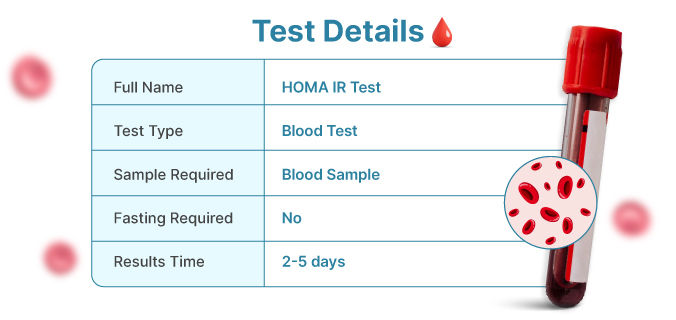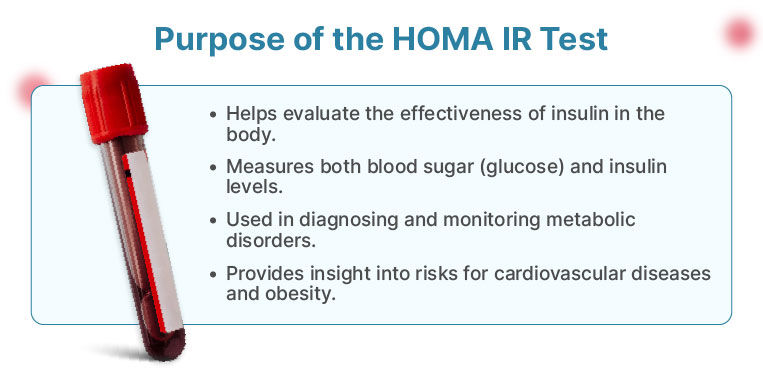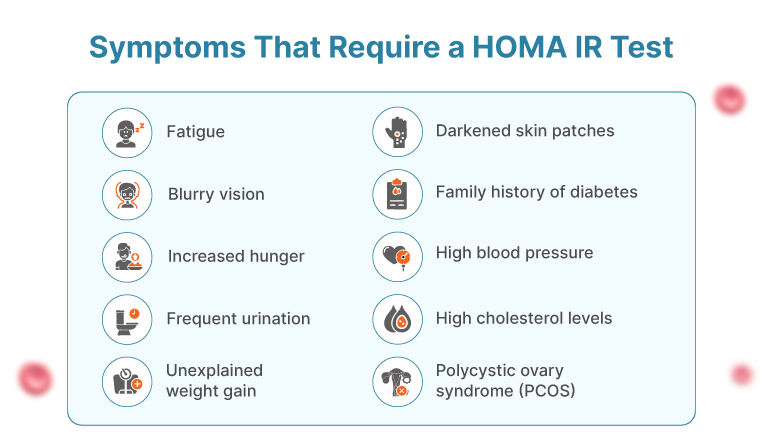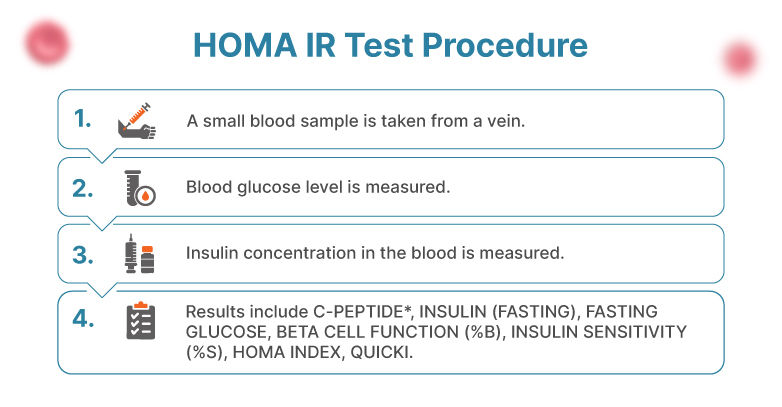HOMA IR Test
10- 12 Hr fasting is required
 Test(s) Included (6)
Test(s) Included (6)
- HOMA IR Test
6 tests included
About

BLOOD

Both

7 years & above
Homa-IR
Test Overview
| Sample Type | Blood |
| Reports Delivery | Earliest reports available within 10 hours |
| Price/Cost | 1550 |
| Number of Tests Included | 7 |

What is a Homa-IR Test?
The Homa IR (Homeostasis Model Assessment of Insulin Resistance) blood test is a widely used method for assessing insulin resistance. Insulin resistance is a condition where the body's cells become less responsive to insulin, a hormone that regulates blood sugar levels. This test calculates insulin resistance based on fasting glucose and insulin levels.
The Homa IR blood test helps identify early stages of insulin resistance, which is crucial for preventing or managing conditions like type 2 diabetes, metabolic syndrome, and cardiovascular diseases. By measuring how effectively the body uses insulin, the HOMA IR test provides a comprehensive insight into a person's metabolic health.
Insulin resistance is a significant marker for various metabolic disorders. When insulin isn't utilised efficiently, the pancreas produces more insulin to compensate, leading to hyperinsulinemia. Over time, this can strain the pancreas, potentially leading to beta-cell dysfunction and type 2 diabetes. Additionally, insulin resistance is often associated with obesity, hypertension, and dyslipidemia, which are components of metabolic syndrome.
The HOMA IR test is particularly useful for individuals who have risk factors for insulin resistance, such as a family history of diabetes, obesity, sedentary lifestyle, or those experiencing symptoms like unexplained weight gain, fatigue, and increased hunger or thirst. Detecting insulin resistance early allows for lifestyle interventions, such as diet and exercise changes, and potentially medical treatment to improve insulin sensitivity and prevent the progression of metabolic diseases.
What is the Homa-IR Test Price?
Homa-IR Test Price in Different Cities
| City | Homa-IR Test Price |
| Bangalore | ₹2004 |
| Hyderabad | ₹2004 |
| Chennai | ₹2004 |
| Gurgaon | ₹1681 |
| Delhi | ₹1681 |
The Homa IR test cost in India varies widely depending on several factors. The cost of the HOMA IR test can be influenced by various determinants.
- Geographical Location: The price of the Homa IR test can differ significantly from one city to another. In metropolitan areas like Mumbai, Delhi, and Bangalore, the cost tends to be higher due to the higher operational costs of laboratories. Conversely, in smaller cities or towns, the price might be lower.
- Laboratory Standards: The quality and accreditation of the laboratory performing the test play a crucial role in determining the cost. Labs with advanced technology, better equipment, and higher standards of testing may charge more. Accredited laboratories, which follow stringent quality control measures, often have higher test prices due to their reliability and accuracy.
- Home Collection Services: Many diagnostic centres offer home collection services, where a phlebotomist visits the patient's home to collect the blood sample. While this service adds convenience, it can also increase the overall cost of the Homa IR test. The additional charge for home collection can vary.
- Discounts and Packages: Some laboratories offer discounts or packages that can reduce the overall cost. For instance, diagnostic centres may provide bundled packages that include multiple tests at a reduced rate, or offer promotional discounts during certain periods. It is beneficial to look out for such offers, especially if multiple tests are required.
- Health Insurance: Coverage for diagnostic tests can also influence out-of-pocket expenses. Some health insurance policies may cover the Homa IR test cost, either partially or fully, depending on the terms of the insurance plan.
Public vs. Private Sector: Tests conducted in government hospitals or public health facilities might be cheaper compared to those in private diagnostic centres. However, the availability and waiting times can differ.
The Homa IR test cost in India is influenced by several factors; thus, It is advisable for individuals to compare prices and services among different laboratories to find the most suitable and cost-effective option.
What is the Purpose of Homa-IR Test?

The Homa IR test is designed to assess insulin resistance, a condition where the body's cells do not respond effectively to insulin. This insulin resistance test, Homa IR, is crucial for identifying several serious health conditions early, enabling timely intervention and management. By calculating insulin resistance using fasting blood glucose and insulin levels, the Homa IR test provides a quantifiable measure of how well the body is responding to insulin.
- Detecting the risk of type 2 diabetes: The primary Homa IR test purpose is to identify individuals who are at risk for developing type 2 diabetes. When cells become resistant to insulin, the pancreas compensates by producing more insulin. This hyperinsulinemia can maintain normal blood glucose levels for a time, but eventually, the pancreatic beta cells may become exhausted, leading to elevated blood glucose levels and diabetes. Early detection through the Homa IR test allows for lifestyle changes and medical interventions to improve insulin sensitivity and delay or prevent the onset of diabetes.
- Evaluating metabolic syndrome: Another significant purpose of the Homa IR test is to evaluate metabolic syndrome, a cluster of conditions that increase the risk of heart disease, stroke, and type 2 diabetes. Metabolic syndrome is characterised by abdominal obesity, high blood pressure, elevated fasting glucose, high triglycerides, and low HDL cholesterol levels. Insulin resistance is a key component of this syndrome. By identifying insulin resistance, the Homa IR test aids in diagnosing metabolic syndrome and implementing comprehensive management strategies.
- Assessing health conditions in case of PCOS: The Homa IR test is also valuable in monitoring individuals with polycystic ovary syndrome (PCOS), a condition commonly associated with insulin resistance. Women with PCOS often exhibit signs of insulin resistance, such as irregular menstrual cycles, hirsutism, and weight gain. The Homa IR test helps in understanding the extent of insulin resistance in these patients, guiding treatment options to improve their metabolic and reproductive health.
- Understanding the effects: Furthermore, the Homa IR test can be used in clinical research to study the effects of various interventions on insulin sensitivity. This includes dietary modifications, exercise programs, and pharmacological treatments aimed at reducing insulin resistance.
Who Should Get a Homa-IR Test Done?

The Homa IR test is recommended for individuals exhibiting certain signs and symptoms that suggest the presence of insulin resistance. Insulin resistance is a condition where the body's cells become less responsive to insulin, leading to various metabolic disturbances. Here are the key groups of people who should consider getting a Homa IR test done:
- Individuals with a Family History of Diabetes: Those with close relatives who have type 2 diabetes are at a higher risk of developing insulin resistance. Genetic factors can predispose individuals to insulin resistance, making the Homa IR test a useful tool for early detection and preventive measures.
- People with Obesity: Obesity, especially abdominal or visceral fat, is strongly associated with insulin resistance. Individuals with a high body mass index (BMI) or those who carry excess weight around their midsection should consider the Homa IR test to assess their insulin sensitivity.
- Those with Sedentary Lifestyles: Physical inactivity is a significant risk factor for insulin resistance. People who lead sedentary lives, characterised by prolonged periods of sitting or minimal physical activity, are more likely to develop insulin resistance. The Homa IR test can help identify early metabolic changes in these individuals.
Individuals with Symptoms of Insulin Resistance: Certain clinical signs can indicate insulin resistance, prompting the need for a Homa IR test. These symptoms include:
Dark, thickened patches of skin, usually found on the neck, armpits, or groyne.
Small, benign growths on the skin.
Unexplained weight gain particularly around the abdomen.
Increased hunger and thirst despite eating normally.
Frequent urination especially at night. - Women with Polycystic Ovary Syndrome (PCOS): PCOS is a common endocrine disorder associated with insulin resistance. Women with PCOS often experience irregular menstrual cycles, hirsutism (excessive hair growth), acne, and weight gain. The Homa IR test helps in evaluating the extent of insulin resistance in these patients, guiding appropriate treatment strategies.
Individuals with Hypertension or Dyslipidemia: High blood pressure and abnormal lipid levels (such as high triglycerides and low HDL cholesterol) are often linked to insulin resistance. People with these conditions should consider the Homa IR test to assess their metabolic health and risk for cardiovascular diseases. - People with a History of Gestational Diabetes: Women who have had gestational diabetes during pregnancy are at an increased risk of developing type 2 diabetes and insulin resistance later in life. The Homa IR test can help in monitoring their metabolic status post-pregnancy.
- Individuals with Metabolic Syndrome: Metabolic syndrome is a cluster of conditions that increase the risk of heart disease, stroke, and type 2 diabetes. These conditions include abdominal obesity, high blood pressure, high fasting glucose, high triglycerides, and low HDL cholesterol levels. The Homa IR test is useful for assessing insulin resistance in individuals with metabolic syndrome.
Components of a Homa-IR Test
Understanding the components of a Homa IR test provides comprehensive insight into your body's insulin production, glucose tolerance, and overall resilience towards developing diabetes. Here are the key components:
- C-Peptide: C-Peptide is a molecule produced by the beta cells in the pancreas, along with insulin. It serves as a marker for insulin production levels in your body. When insulin is produced by the pancreas, it is initially part of a larger molecule called proinsulin, which splits into insulin and C-peptide. Measuring C-peptide levels can help assess how much insulin the body is producing.
- Insulin (Fasting): This component measures the amount of insulin in your blood after you have fasted for about eight hours, helping doctors assess your body's ability to produce insulin. High fasting insulin levels can indicate insulin resistance, where the body's cells do not respond properly to insulin.
- Fasting Glucose: Fasting glucose measures the level of glucose in your blood when you have not eaten for at least eight hours, offering an understanding of how effectively your body utilises glucose. Elevated fasting glucose can indicate impaired glucose metabolism and is a key marker for diabetes and insulin resistance.
- Beta Cell Function (%B): This assessment shows how well the beta cells in your pancreas are working to produce and secrete insulin. The %B is an estimate of how well these cells are functioning. This calculation is derived from fasting insulin and glucose levels. A high %B indicates robust insulin production, while a low %B suggests diminished beta cell function, which can be a precursor to diabetes.
- Insulin Sensitivity (%S): This measurement indicates how sensitive your body's cells are to insulin. The higher the percentage, the better your body uses insulin to lower blood sugar levels.
- HOMA Index: This calculation uses fasting glucose and fasting insulin levels to evaluate insulin resistance and beta-cell function.
- QUICKI: The Quantitative Insulin Sensitivity Check Index (QUICKI) is another computation that uses fasting glucose and fasting insulin levels to assess insulin sensitivity.
Understanding Homa-IR Test Report
Below are the low, high and Homa IR test normal range values, measured by this diagnostic test:
| Test | Normal Range | High Range | Low Range | Borderline Range |
| C-Peptide | 0.78-5.19 ng/mL | > 5.19 ng/mL | < 0.78 ng/mL | N/A |
| Insulin (Fasting) | 2.6-24.9 μU/mL | > 24.9 μU/mL | < 2.6 μU/mL | N/A |
| Fasting Glucose | 70-99 mg/dL | ≥ 126 mg/dL | < 70 mg/dL | 100-125 mg/dL |
| Beta Cell Function (%B) | 40-150% | > 150% | < 40% | N/A |
| Insulin Sensitivity (%S) | 100-400% | < 100% | > 400% | N/A |
| HOMA Index | 0.5-1.4 | > 1.4 | < 0.5 | N/A |
| QUICKI | 0.357-0.437 | < 0.357 | > 0.437 | N/A |
C-Peptide
| High values may indicate | Low values may indicate |
| Increased insulin production due to conditions like insulinoma(a tumour of the insulin-producing cells in the pancreas), or renal failure | Reduced insulin production which may be seen in type 1 diabetes or advanced stages of type 2 diabetes |
Insulin (Fasting)
| High values may indicate | Low values may indicate |
| Insulin resistance, which is often a precursor to type 2 diabetes. | Insulin deficiency, which could be indicative of type 1 diabetes. |
Fasting Glucose
| High values may indicate | Low values may indicate |
| Prediabetes or diabetes as it suggests your body isn't properly using glucose. | Hypoglycaemia, indicating a low blood sugar level that could cause various health problems. |
Beta Cell Function (%B)
| High values may indicate | Low values may indicate |
| The body is compensating for insulin resistance by producing more insulin. | The beta cells in the pancreas are not functioning properly, which could lead to diabetes. |
Insulin Sensitivity (%S)
| High values may indicate | Low values may indicate |
| High values are desirable as they show your body's cells are responding well to insulin. | Low values suggest your cells are not responding effectively to insulin, indicating insulin resistance. |
HOMA Index
| High values may indicate | Low values may indicate |
| Insulin resistance and a higher risk for the development of diabetes. | Low values are considered normal. |
QUICKI
| High values may indicate | Low values may indicate |
| Good insulin sensitivity, which is desirable. | Decreased insulin sensitivity and potential insulin resistance. |
Preparation and Procedure for Homa-IR Test

For Homa IR test preparation, fasting for 8-12 hours is required. Avoid medications, alcohol, and high-fat foods. Follow instructions from your doctor. Stay hydrated with water only. This ensures accurate measurement of insulin resistance.
How is Homa-IR Test Done?
The Homa IR test is a blood test that measures insulin resistance. The entire process is quick, typically taking a few minutes for the blood draw and a few days for results. First, you need to fast for 8-12 hours.
- At the laboratory, a healthcare professional will draw a blood sample from a vein in your arm.
- The blood sample is then sent to a lab where glucose and insulin levels are measured.
- These values are used to calculate the Homa IR score, which helps in assessing how effectively your body uses insulin, which is crucial for diagnosing conditions like diabetes and metabolic syndrome.
Is Fasting Required for a Homa-IR Test?
Yes, fasting is required for a Homa IR test. You need to abstain from eating and drinking anything except water for 8-12 hours before the test. Fasting ensures accurate measurement of fasting glucose and insulin levels, which are essential for calculating the Homa IR score. Consult your healthcare provider for specific instructions.
What Time of the Day Should I Undergo a Homa-IR Test?
The Homa IR test is typically done in the morning after an overnight fast of 8-12 hours. Morning testing ensures that your fasting glucose and insulin levels are stable, providing accurate results. Scheduling the test early in the day also allows you to resume normal eating patterns sooner. Follow your healthcare provider's guidance on timing.
Booking Homa-IR Test Online & Check Reports
This section will guide you through the simple process of booking a Homa IR test online at Apollo 24|7 and the steps to download the Homa IR test report once they are ready.
What are the Steps to Schedule a Homa-IR Test on Apollo 24|7
Booking a Homa IR test through Apollo 24|7 is straightforward and easy. It's a quick, user-friendly process that can be done from the comfort of your home. Here are the steps:
1. Visit Apollo 24|7 Website or App: Launch by visiting the Apollo 24|7 website, or downloading their app from your smartphone’s app store. The design of both platforms is user-friendly, allowing for easy navigation.
2. Search for the Test: Once at the homepage, use the search box and type in "Homa IR test near me". This action will direct you to a dedicated page for dengue rapid test.
3. Choose Time and Place: On reaching the Homa IR blood test page, you have the flexibility to pick a time slot and location that best suits your schedule for blood sample collection. The Homa IR test price will also be displayed here.
4. Finalise Your Booking: After selecting your preferred time and location, proceed to finish your booking by providing all necessary details.
5. Await Confirmation: After successfully booking your Homa IR test, sit tight until you receive a confirmation message from Apollo 24|7. This final step ensures that your request has been processed correctly.
How do I Access by Homa-IR Test Results Online on Apollo 24|7?
If you've undergone a Homa IR test, procuring your results is an important step in your health journey. Apollo 24|7 provides a seamless online platform that allows you to access your Homa IR test list reports conveniently and securely. Here's how you can access your Homa IR test report online:
1. Await Notification: Once your Homa IR test procedure is completed and the experts have prepared your report, Apollo 24|7 will send a notification to inform you that your results are ready for review.
2. Log in to Your Account: Use your username and password to log in to your Apollo 24|7 account. This can be done via their website or mobile application.
3. Visit the Reports Section: After logging in, look for the 'Reports' section on your dashboard. This section contains all of your medical reports, including the Homa IR test report.
4. Select Your Test: Navigate through your saved reports and choose the specific one for the Homa IR test report.
5. Download Report: Each report includes a download option which allows you to save an electronic copy of your Homa IR test result for future reference or consultations with your doctor.
 Frequently Asked Questions (FAQs)
Frequently Asked Questions (FAQs)
If my Homa IR blood test results are higher, what are the next steps? Should I consult a specialist or make specific lifestyle changes?
If your Homa IR results are high, you should consult a doctor or endocrinologist. They may recommend specific lifestyle changes, such as improving diet, increasing physical activity, and managing weight, to reduce insulin resistance. Medication might be considered if lifestyle changes are insufficient.
Are there any alternative or complementary tests to consider alongside a Homa IR test for a more comprehensive assessment?
Yes, other tests include the Oral Glucose Tolerance Test (OGTT), fasting glucose levels, fasting insulin levels, and HbA1c. More advanced methods like the euglycemic-hyperinsulinemic clamp and insulin tolerance test can provide a comprehensive assessment of insulin resistance and beta-cell function.
Are there any emerging technologies or advancements in Homa IR testing that I should be aware of?
Emerging technologies include continuous glucose monitoring (CGM) and advanced insulin assays, which offer more detailed and dynamic assessments of glucose and insulin levels. These advancements provide better insights into insulin resistance and glucose metabolism over time.
Can I drink water before Homa IR test?
Yes, you can drink water before a Homa IR test. It is important to stay hydrated, but avoid other beverages, especially those containing sugar or caffeine, as they can affect fasting glucose and insulin levels.
How accurate is Homa IR for the diagnosis of cardiovascular diseases?
Homa IR is not a diagnostic tool for cardiovascular diseases (CVD) but indicates insulin resistance, a risk factor for CVD. While useful for assessing metabolic health, it should be combined with other tests and risk assessments for comprehensive CVD evaluation.
Can medications affect my Homa IR test?
Yes, medications such as corticosteroids, antipsychotics, and some diabetes medications can affect Homa IR results by altering glucose and insulin levels. Inform your doctor about all medications you are taking before the test.
How often should Homa IR be measured?
The frequency of Homa IR measurement depends on individual health status and risk factors. Typically, it is monitored annually or biannually for at-risk individuals, or more frequently if indicated by significant changes in health or treatment plans.
What are the limitations of Homa IR?
Yes, medications such as corticosteroids, antipsychotics, and some diabetes medications can affect Homa IR results by altering glucose and insulin levels. Inform your doctor about all medications you are taking before the test.
What factors can affect Homa IR values?
Factors affecting Homa IR values include diet, physical activity, stress, sleep, medication use, underlying health conditions, and timing of the test. Proper fasting and consistent conditions are crucial for accurate results.
What is a HOMA-IR blood test?
The HOMA IR (Homeostatic Model Assessment of Insulin Resistance) test measures insulin resistance by analysing fasting blood glucose and insulin levels. It helps assess how effectively the body responds to insulin and is commonly used to evaluate the risk of type 2 diabetes and metabolic disorders.
What is the price of the Homa IR Test?
The cost of the HOMA IR test typically ranges from ₹___ to ₹___, depending on the diagnostic center, location, and additional services like home sample collection.
What is a normal HOMA level?
A normal HOMA IR score is generally below 1.9, indicating good insulin sensitivity. A value between 1.9 and 2.9 suggests mild insulin resistance, while above 2.9 indicates significant insulin resistance, which may require medical intervention.
What if the HOMA index is high?
A high HOMA IR index suggests insulin resistance, meaning the body is struggling to use insulin effectively. This increases the risk of type 2 diabetes, obesity, metabolic syndrome, and cardiovascular diseases. Lifestyle changes, such as a healthy diet, regular exercise, and weight management, can help lower insulin resistance.
Does HOMA-IR predict diabetes?
Yes, HOMA IR is a strong predictor of type 2 diabetes, as insulin resistance is an early indicator of developing the condition. Individuals with consistently high HOMA IR levels should monitor their glucose levels and adopt preventive lifestyle measures.
What is a normal insulin resistance level (HOMA)?
A HOMA IR value below 1.9 is considered normal and indicates healthy insulin sensitivity. Values above 2.9 suggest insulin resistance, which may require medical attention to prevent metabolic complications.
Specialises in Blood Studies
Book Popular Tests at Home
Hba1c (glycated Hemoglobin) | Cholesterol - Serum | Complete Urine Examination (cue) | Glucose, Fasting | Glucose, Random | Creatinine - Serum | C-reactive Protein (crp) - Quantitative | Culture And Sensitivity - Urine (automated) | Prothrombin Time (pt/inr) | Erythrocyte Sedimentation Rate (esr) | Beta Hcg (total) | Uric Acid - Serum | Electrolytes - Serum | Urea And Creatinine | Blood Group Abo And Rh Factor | Ferritin | Vitamin B12 | Hbsag Screening - Rapid | ProlactinBook HOMA IR Test Test in Other Cities
Homa Ir Test in Delhi | Homa Ir Test in Noida | Homa Ir Test in Faridabad | Homa Ir Test in Gurugram | Homa Ir Test in Ghaziabad | Homa Ir Test in Hyderabad | Homa Ir Test in Bangalore | Homa Ir Test in Kolkata | Homa Ir Test in Chennai | Homa Ir Test in Mumbai | Homa Ir Test in Ahmedabad | Homa Ir Test in Pune | Homa Ir Test in Lucknow | Homa Ir Test in Vizag | Homa Ir Test in VijayawadaBook Popular Packages with Apollo
Apollo Prime Health Plan | Apollo Thyroid Assessment - Basic | Apollo Vitamin Check - Basic | Apollo Diabetes Panel - Basic | Apollo Full Body Check - Advance IWhy should Apollo be your preferred healthcare partner?
- 40 Years of legacy and credibility in the healthcare industry.
- NABL certified multi-channel digital healthcare platform.
- Affordable diagnostic solutions with timely and accurate test results.
- Up to 60% discount on Doorstep Diagnostic Tests, Home Sample Collection.
- An inventory of over 100+ laboratories, spread across the country, operating out of 120+ cities with 1200+ collection centers, serving over 1800+ pin codes.
The information mentioned above is meant for educational purposes only and should not be taken as a substitute to your Physician’s advice. It is highly recommended that the customer consults with a qualified healthcare professional to interpret test results


